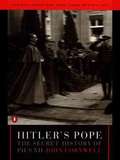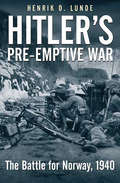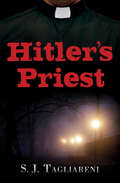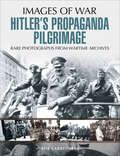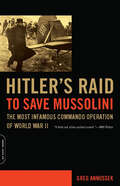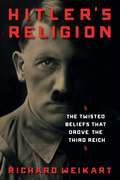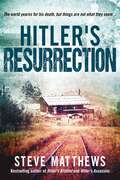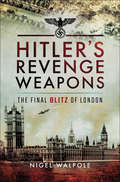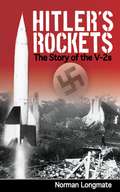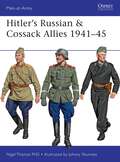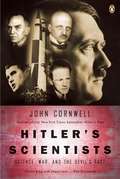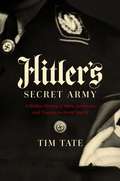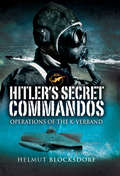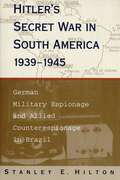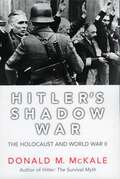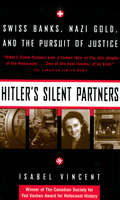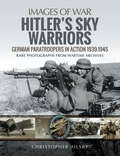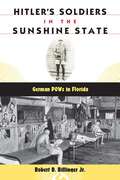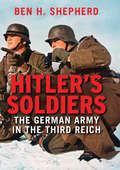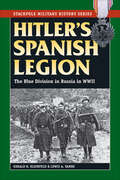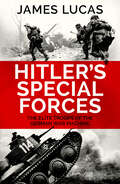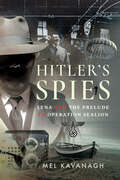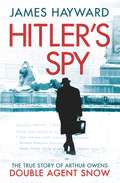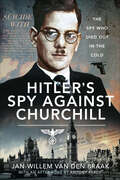- Table View
- List View
Hitler's Pope: The Secret History of Pius XII
by John CornwellThe "explosive" (The New York Times) bestseller-now with a new introduction by the author <P> When Hitler's Pope, the shocking story of Pope Pius XII that "redefined the history of the twentieth century" (The Washington Post ) was originally published, it sparked a firestorm of controversy both inside and outside the Catholic Church. Now, award-winning journalist John Cornwell has revisited this seminal work of history with a new introduction that both answers his critics and reaffirms his overall thesis that Pius XII, now scheduled to be canonized by the Vatican, weakened the Catholic Church with his endorsement of Hitler-and sealed the fate of the Jews in Europe.
Hitler's Pre-emptive War: The Battle for Norway, 1940
by Henrik O. LundeAn &“excellent&” history of the often overlooked WWII campaign in which Hitler secured a vital resource lifeline for the Third Reich (Library Journal). After Hitler conquered Poland and was still fine-tuning his plans against France, the British began to exert control over the coastline of neutral Norway, an action that threatened to cut off Germany&’s iron-ore conduit to Sweden and outflank from the start its hegemony on the Continent. The Germans responded with a dizzying series of assaults, using every tool of modern warfare developed in the previous generation. Airlifted infantry, mountain troops, and paratroopers were dispatched to the north, seizing Norwegian strongpoints while forestalling larger but more cumbersome Allied units. The German navy also set sail, taking a brutal beating at the hands of Britannia, but ensuring with its sacrifice that key harbors would be held open for resupply. As dive-bombers soared overhead, small but elite German units traversed forbidding terrain to ambush Allied units trying to forge inland. At Narvik, some six thousand German troops battled twenty thousand French and British until the Allies were finally forced to withdraw by the great disaster in France, which had then gotten underway. Henrik Lunde, a native Norwegian and former US Special Operations colonel, has written the most objective account to date of a campaign in which twentieth-century military innovation found its first fertile playing field.
Hitler's Priest (Hitler's Priest Ser.)
by S.J. TagliareniA brilliant young atheist in Weimar Germany finds himself among Hitler&’s inner circle—as his moral conscience—in this debut historical thriller.Hans Keller was always highly intelligent—so much so that he learned to place little value in what the school or church tries to teach him. But after a chance meeting with the charismatic Josef Goebbels, a leader of the burgeoning Nazi Party, atheistic Hans is offered a key role in shaping the future of the new Germany: providing essential influence within the Catholic Church. As the nation prepares for war, Hans finds himself gaining power in a shadowy world of manipulation and deceit. He soon rises to a level of ultimate status—and ultimate compromise—as Hitler&’s personal priest. In this original thriller full of fascinating period detail, author and former priest S. J. Tagliareni offers a rare window into the psychological and moral conflicts raised by Nazi Germany and the Holocaust.
Hitler's Propaganda Pilgrimage (Images of War)
by Bob CarruthersThe famous image of Hitler in Paris has become one of the most iconic images of the Second World War. However, Hitler only spent a few hours in Paris before heading to Flanders to re-visit the sites of the battlefields where he had served during the Great War. He was on a propaganda mission to publicize his own war service and a full photographic record of Hitler's visits to France and Flanders was produced by Heinrich Hoffman, Hitler's personal photographer. Those photographs from 1940 have now been collected together for the first time and are reproduced here along with all of the most important surviving images of Hitler in the Great War.Featuring rare and previously unpublished images of Hitler in France and Flanders from 1914 to 1940, this important photographic study documents a vital but often overlooked chapter in the story of Adolf Hitler.
Hitler's Raid to Save Mussolini: The Most Infamous Commando Operation of World War II
by Greg AnnussekSpringing Mussolini from the mountaintop hotel in which his king and country had imprisoned him was the easy part. Sorting out who did what and when is the tricky bit. Working from an array of primary sources, independent scholar Annussek sorts the self-serving statements from the outright lies to describe the nazi raid that sprung Mussolini, complete with its gliders, paratroopers, ranks of commandos blasting through what were in fact their ally's ranks, open bragging by the victors and, on the part of the general public, confusion about how and why Hitler decided Mussolini was safer on the loose than he was bricked up. Annussek describes how the war in Italy factored in the Berlin-Rome alliance, how saving Mussolini temporarily worked in terms of German morale, and how the very odd relationship between Hitler and Mussolini complicated the motives for the raid even more. Annotation ©2006 Book News, Inc. , Portland, OR (booknews. com)
Hitler's Religion: The Twisted Beliefs that Drove the Third Reich
by Richard WeikartFor a man whom history can never forget, Adolf Hitler remains a persistent mystery on one front-his religious faith. Atheists tend to insist Hitler was a devout Christian. Christians counter that he was an atheist. And still others suggest that he was a practicing member of the occult. <P><P>None of these theories are true, says historian Richard Weikart. Delving more deeply into the question of Hitler's religious faith than any researcher to date, Weikart reveals the startling and fascinating truth about the most hated man of the 20th century: Adolf Hitler was a pantheist who believed nature was God. <P><P>In Hitler's Religion, Weikart explains how the laws of nature became Hitler's only moral guide-how he became convinced he would serve God by annihilating supposedly "inferior" human beings and promoting the welfare and reproduction of the allegedly superior Aryans in accordance with racist forms of Darwinism prevalent at the time.
Hitler's Resurrection
by Steve MatthewsNazi Germany has been crushed, but is the war really over?Klara, Hitler&’s personal cook, swears she glimpsed him fleeing the Berlin bunker via a secret tunnel.The world needs undeniable proof of the Fuhrer&’s death, but it&’s not that simple. While Allied intelligence agents scour Europe to find such proof, and a Hitler double – &‘the Wolf&’ – lays a false trail across two continents, the real Hitler hides out in a Polish monastery, desperate to find his gold train so he can fund the Fourth Reich. Klara, already pregnant with Martin Bormann&’s child, is one of the countless women brutally raped as Russian forces take Berlin. She miscarries and can&’t help wondering if she will ever be free of the war&’s burden. Meanwhile, her sister Natalka is working with the Polish government, tracking down and executing Nazi fugitives. She locates Klara and recruits her to help track Hitler: as his former cook, Klara can infiltrate his inner circle. They find Hitler&’s hideout via a tip-off. Klara makes tentative contact: the Fuhrer, weakened and isolated, is thrilled to have her back as his cook – and companion. He feels no threat from her but – profoundly traumatised by the war, the death camps, the rape and miscarriage – Klara can take no more. Following a defining act of conscience, she gains closure at last, for both herself and the crippled world. But one final twist awaits, revealing a future she couldn&’t possibly have imagined!
Hitler's Revenge Weapons: The Final Blitz of London
by Nigel WalpoleFrom September 1940 until May 1941, Britain - especially Greater London - suffered heavily under a barrage of day and nighttime raids by the then mighty Luftwaffe; raids which killed some 20,000 people and destroyed or damaged one million homes during what came to be known as the London Blitz. A baby blitz followed, from January to May 1944, which was destined to be the final manned bomber offensive by a much depleted Luftwaffe. Afterwards, there came the last gasp, the final blitz on London, this time delivered by the V1 flying bombs and V2 rockets which were aimed at the capital. Overall, the V weapons killed or seriously injured 31,000 in London and destroyed or seriously damaged 1.6 million houses throughout Britain. Yet despite all this, British industry, economy and morale remained largely intact.Group Captain Nigel Walpole grew up in London during the Blitz and he has traced the full history of the V1 'doodlebugs' and V2 rockets that terrorized so many at this time. He looks at the infamous missile development site at Peenemunde and the engineers who brought Hitler's horrific visions to life. He reports his vivid memories of the three Blitz campaigns and the countermeasures taken in response to them. Having been granted direct access to the history of the V weapons, he describes the evolution, development, production deployment and launch of the flying bombs and rockets. Whilst acknowledging the terrible damage inflicted by these weapons, Nigel also recognizes them as an example of Germanys extraordinary capacity for innovation and determination during one of the darkest periods of world history.
Hitler's Rockets: The Story of the V-2s
by Norman LongmateIn Hitler's Rockets Norman Longmate tells the story of the V-2, the technically brilliant but hated weapon, the ancestor and forerunner of all subsequent ballistic missiles. He reveals the devious power-play within the German armed forces and the Nazi establishment that so influenced the creation of the rockets. He shows through contemporary documents and protagonists' accounts how the British intelligence skillfully pieced together often contradictory evidence as it sought to establish the true nature of the threat. Finally he recalls in detail the feel and fears of the time from the viewpoint of those who suffered, and those who were all too conscious tat they were the target.
Hitler's Russian & Cossack Allies 1941-45
by Johnny Shumate Nigel ThomasGiven the merciless way in which the war on the Eastern Front of World War II was conducted, it is difficult to imagine soldiers changing allegiance from one side to another. Yet after the German invasion of Russia in Operation Barbarossa, well over 400,000 former Soviet Citizens went on to fight for Nazi Germany in some capacity. These included not only the 'legions' recruited from non-Russian ethnic groups eager for freedom from Stalin's dictatorship, but also some 100,000 Russians and Cossacks. What began as small local security units of 'Ostruppen', enrolled for the ongoing campaigns against Soviet partisans, were later reorganized, given special systems of uniform and insignia, amalgamated into larger formations, and eventually committed to the front line. This book offers up an essential guide to the appearance, formation and equipment of the myriad Russian and Soviet units that fought for the Germans. It uses rare photographs and revealing color illustrations to create a peerless visual reference to the troops who switched from one ruthless superpower to another and met with a horrific fate when the fighting was over.
Hitler's Scientists
by John CornwellAn eye-opening account of the rise of science in Germany through to Hitler's regime, and the frightening Nazi experiments that occurred during the ReichA shocking account of Nazi science, and a compelling look at the the dramatic rise of German science in the nineteenth century, its preeminence in the early twentieth, and the frightening developments that led to its collapse in 1945, this is the compelling story of German scientists under Hitler's regime. Weaving the history of science and technology with the fortunes of war and the stories of men and women whose discoveries brought both benefits and destruction to the world, Hitler's Scientists raises questions that are still urgent today. As science becomes embroiled in new generations of weapons of mass destruction and the war against terrorism, as advances in biotechnology outstrip traditional ethics, this powerful account of Nazi science forms a crucial commentary on the ethical role of science.
Hitler's Scientists: Science, War and the Devil's Pact
by John CornwellIn a rich and fascinating history John Cornwell tells the epic story of Germany's scientists from the First World War to the collapse of Hitler's Reich. He shows how Germany became the world's Mecca for inventive genius, taking the lion's share of Nobel awards, before Hitler's regime hijacked science for wars of conquest and genocidal racism. Cornwell gives a dramatic account of the wide ranging Nazi research projects, from rockets to nuclear weapons; the pursuit of advanced technology for irrational ends, concluding with with penetrating relevance for today: the inherent dangers of science without conscience.
Hitler's Secret Army: A Hidden History Of Spies, Saboteurs, And Traitors
by Tim TateThis dramatic exposé of Allied subterfuge and betrayal uncovers the treachery of undercover fascists and American Nazi spy rings during the height of World War II. Between 1939 and 1945, more than seventy Allied men and women were convicted—mostly in secret trials—of working to help Nazi Germany win the war. In the same period, hundreds of British Fascists were also interned without trial on specific and detailed evidence that they were spying for, or working on behalf of, Germany. Collectively, these men and women were part of a little-known Fifth Column: traitors who committed crimes including espionage, sabotage, communicating with enemy intelligence agents and attempting to cause disaffection amongst Allied troops. Four of these traitors were sentenced to death; two were executed, whilst most of the others received lengthy prison sentences or were interned throughout the war. Hundreds of official files, released piecemeal and in remarkably haphazard fashion in the years between 2002 and 2017, reveal the truth about the Allied men and women who formed these spy rings. Most were ardent fascists: all willingly betrayed their own country in the hope and anticipation of a German victory. Several were part of international espionage rings based in the United States. If these men and women were, for the most part, lone wolves or members of small networks, others were much more dangerous. In 1940, during some of the darkest days of the war, two well-connected British Nazi sympathizers planned overlapping conspiracies to bring about a “fascist revolution.” These plots were foiled by Allied spymasters through radical—and often contentious—methods of investigation. Its agents set up elaborate agent provocateur and sting operations which uncovered scores of the Nazi sympathizers seeking to pass military and defense secrets to the enemy.
Hitler's Secret Commandos: Operations of the K-Verband
by Helmut BlocksdorfAn extensive history of the amphibious attack unit created by Nazi Germany during World War II.Hitler&’s Secret Commandos is the history of the K-Verband naval commando unit, established in 1943 to wreak havoc amongst invading allied forces involved in amphibious landings or actions, against German-occupied coasts. Following the Italian and British example, the basic idea was for a small, exceptionally well-trained and reliable commando force using the maximum element of surprise. Midget U-boats and small torpedo-carrying craft along the lines of the &“explosive boats&” used by the Italian Navy were designed for individual operations while a naval assault troop was formed for missions against important enemy operational targets near the sea after being landed from naval vessels offshore. Using German archive material, first-hand accounts and other published material this is the first comprehensive history of the K-Verband. It charts the development, structure, selection, training and equipment the Commando unit used together with a detailed narrative of the operations undertaken. The material has been translated from a German text, previously published in Germany with wide acclaim.
Hitler's Secret War in South America, 1939--1945: German Military Espionage and Allied Counterespionage in Brazil
by Stanley E. HiltonPublished first in Brazil as Suástica sobre o Brasil, this examination of the rise and fall of German espionage in that country spent months on the best-seller list there and generated a national furor as former spies and collaborationists denounced it as a CIA ploy. Here, for the first time, are the colorful stories of such German agents as "Alfredo," probably the most important enemy operative in the Americas; "King," who was decorated for his daring exploits but who carelessly mentioned the real names of his collaborators in secret radio messages; the bumbling Janos Salamon; and the debonair Hans Christian von Kotze, who ultimately betrayed the Abwehr (German Military Intelligence).Eminently readable, Hitler's Secret War in South America resembles, but is not, fiction. It describes in detail the Allies' real battle against the Abwehr, a struggle highlighted by the interception and deciphering of German radio transmissions.
Hitler's Shadow War: The Holocaust and World War II
by Donald M. McKaleIn Hitler's Shadow War, World War II scholar Donald M. McKale contends that the persecution and murder of the Jews, Slavs, and other groups was Hitler's primary effort during the war, not the conquest of Europe. According to McKale, Hitler and the Nazi leadership used the military campaigns of the war as a cover for a genocidal program that centered on the Final Solution. Hitler continued to commit extensive manpower and materials to this "shadow war" even when Germany was losing the battles of the war's closing years.
Hitler's Silent Partners: Swiss Banks, Nazi Gold, and the Pursuit of Justice
by Isabel VincentAward-winning journalist Isabel Vincent unravels the labyrinthine story behind the headlines by taking us through the life of survivor Renée Appel, who found refuge in Canada. With her, we come to understand what it means to wait for justice: how, on the eve of war, desperate men and women entrusted their life savings to Swiss banks; how Nazis laundered gold looted from Jewish families; how the demands of international business, Swiss bank secrecy, and greed kept the truth hidden for over half a century and still prevent restitution from being made. Hitler's Silent Partners is a rigorous and often heartbreaking look at statistics seldom given a human face.From the Trade Paperback edition.
Hitler's Sky Warriors: German Paratroopers in Action 1939–1945 (Images of War)
by Christopher AilsbyDuring the Second World War, the German Fallschirmjger (paratroopers) carried out many successful and daring operations, such as the capture of the Belgian fortress at Eben Emael in 1940 and the invasion of Crete in 1941. Hitler's Sky Warriors is a detailed examination of all the battles and campaigns of the Third Reich's airborne forces, illustrated throughout by many previously unpublished photographs. Hitler's Sky Warriors includes detailed accounts of all the ground campaigns of the parachute divisions, especially in Italy, where their epic defenses of Monte Cassino entered military legend. As well as being a comprehensive account of Fallschirmjger battles and campaigns, Hitler's Sky Warriors includes information on the specialist weapons and equipment developed for Germany's airborne forces. These include the paratrooper helmet, the FG 42 automatic rifle, the so-called 'gravity knife', the different jump smocks, parachutes and harnesses, transport aircraft and gliders. Hitler's Sky Warriors also contains biographical details on all the main parachute commanders, such as Kurt Student, Bernhard Herman Ramcke and Richard Heidrich, and includes appendices that contain information about divisional orders of battle and Knight's Cross winners. In this way Hitler's Sky Warriors builds into an extensive and exciting account of one of the elite formations of military history.
Hitler's Soldiers in the Sunshine State: German POWs in Florida (Florida History and Culture)
by Robert D. Billinger Jr."They were Uncle Sam's smiling workers and they looked like all-American boys. There were at least 10,000 of them, deployed in 25 Florida camps between 1942 and 1946. They were also members of the Wehrmacht, Hitler's armed forces."--Forum"Most Americans were unaware their government was housing Hitler's soldiers on its shores. . . . Billinger weaves interviews with former prisoners, American soldiers who worked in the camps, newspaper accounts, and government documents into a stunning historical narrative."--Kansas City Star"A tropical paradise that for some became a tropical hell."--Sarasota Herald-Tribune"First came crewmen of destroyed U-boats, then thousands of Afrika Korps veterans who swamped the system in 1943. Pro-Nazi, arrogant, and tough, they defied U.S. authorities, terrorized anti-Nazi inmates, and rioted."--Choice"Filled with colorful personal accounts, this historical book packs the punch of fiction."--St. Petersburg Times"Billinger's first-rate history of this little-known chapter in American history teaches us that, in spite of wartime propaganda, our enemies are human, too."--Atlantic City Press"Hard to put down."--Daytona Beach News-Journal In the first book-length treatment of the German prisoner of war experience in Florida during World War II, Robert D. Billinger, Jr., tells the story of the 10,000 men who were "guests" of Uncle Sam in a tropical paradise that for some became a tropical hell. Having been captured while serving on U-boats off the Carolinas, with the Afrika Korps in Tunisia, with the paratroops in Italy, or with labor battalions in France, the POWs were among the 378,000 Germans held as prisoners in 45 states. Except for the servicemen who guarded them, the civilian pulp-cutters, citrus growers, and sugarcane foremen who worked them, and the FBI and local police who tracked the escapees among them, most people were--and still are--unaware of the German POWs who inhabited the 27 camps that dotted the Sunshine State. Billinger describes the experiences of the Germans and their captors as both sides came to the realization that, while the Germans’ worst enemies were often their own comrades-in-arms, wartime enemies might also become life-long friends. Concentrating especially on the story of Camp Blanding in North Florida, Billinger based his research on both American and German archives. His account mixes rare photos with interviews with former prisoners; reports by the International Red Cross, the YMCA, and the U.S. military; and local newspaper articles. This book will be of great value to scholars and historians, as well as all readers with an interest in World War II. Those with an interest in Florida history will also find much to admire in this engaging account of a barely known wartime episode.A volume in The Florida History and Culture Series, edited by Raymond Arsenault and Gary R. Mormino.
Hitler's Soldiers: The German Army in the Third Reich
by Ben H. ShepherdFor decades after 1945, it was generally believed that the German army, professional and morally decent, had largely stood apart from the SS, Gestapo, and other corps of the Nazi machine. Ben Shepherd draws on a wealth of primary sources and recent scholarship to convey a much darker, more complex picture. For the first time, the German army is examined throughout the Second World War, across all combat theaters and occupied regions, and from multiple perspectives: its battle performance, social composition, relationship with the Nazi state, and involvement in war crimes and military occupation. This was a true people's army, drawn from across German society and reflecting that society as it existed under the Nazis. Without the army and its conquests abroad, Shepherd explains, the Nazi regime could not have perpetrated its crimes against Jews, prisoners of war, and civilians in occupied countries. The author examines how the army was complicit in these crimes and why some soldiers, units, and higher commands were more complicit than others. Shepherd also reveals the reasons for the army's early battlefield successes and its mounting defeats up to 1945, the latter due not only to Allied superiority and Hitler's mismanagement as commander-in-chief, but also to the failings--moral, political, economic, strategic, and operational--of the army's own leadership.
Hitler's Spanish Legion: The Blue Division in Russia in WWII (Stackpole Military History Series)
by Gerald R KleinfeldA history of the 47,000 Spanish soldiers who volunteered to fight for Hitler in Russia during World War II. Although Spain claimed neutrality during World War II, 47,000 Spaniards volunteered to fight on behalf of the Third Reich. Known as the Blue Division, they battled the Soviets on the Eastern Front and played a key role in the pivotal siege of Leningrad. Set apart from the Wehrmacht by stark differences in culture, tactics, and command structure, these volunteers fought—many of them to the death—with courage and tenacity against strong opposition, extreme temperatures, and insufficient supplies for what they believed was their chance to secure Spain&’s place in a new and changing Europe.
Hitler's Special Forces: The elite troops of the German war machine
by James LucasBlood, fire and iron: An unforgettable portrait of the most feared soldiers of World War Two In the closing years of the 1930s, German agent-provocateurs worked in secrecy. These crack units of elite soldiers paved the way for the invasions of Czechoslovakia and Poland, the spark that would ignite a war across Europe. In time, they would go on to shape the conflict with terrifying ferocity and skill. The mysteries of German special forces are revealed here, with incisive analysis of naval, military and aerial operations, and vivid descriptions of suicide pilots, human torpedoes and explosive motor boats. James Lucas delivers one of the fullest and most accessible ever accounts of the elite troops known as Kommandos, across both their achievements and failures to stave off impending military defeat. This is war at its toughest, most harrowing and most extreme.
Hitler's Spies: Lena and the Prelude to Operation Sealion
by Mel KavanaghThe incredible true story of the first four Nazi spies to infiltrate British soil is revealed in this WWII history.After the swift takeover of France and the Low Countries, Nazi Germany was on the crest of a wave. Only the United Kingdom stood in its way. Hitler quickly devised plans for the invasion of England, codenamed Operation Sealion. To lay the groundwork, a team of spies would be sent in advance to act as pathfinders for the incoming forces. Codenamed Operation Lena, this phase of the plan was considered a suicide mission by German military intelligence. They had only thirty days to recruit and train agents who had a less than convincing grasp of English language or customs. Hitler’s Spies revels the story of the first four agents to arrive on English soil—collectively known by MI5 as “The Brussels Four.”Using a wealth of primary materials, including newly declassified sources, Mel Kavanagh sheds light on one of the most audacious yet little-known operations of the Second World War, in which undertrained men were sent behind enemy lines at a time when Britain was gripped by spy paranoia.
Hitler's Spy
by James HaywardOriginally published as Double Agent Snow, Hitler's Spy is the paperback edition, which tells of how on the eve of the outbreak of the Second World War the double-agent Arthur Owens, codenamed SNOW, is summoned to Berlin and appointed Hitler's chief spy in Britain. Days later he finds himself in Wandsworth prison, betrayed by the wife he traded for a younger model, and forced to transmit false wireless messages for MI5 to earn his freedom - and avoid the hangman's noose. A vain and devious anti-hero with no moral compass, Owen's motives were status, money and women. He mixed fact with fiction constantly, and at times insisted that he was a true patriot, undertaking hazardous secret missions for his mother country; at other times, Owens saw himself as a daring rogue agent, outwitting British Intelligence and loyal only to the Fatherland. Yet in 1944, as Allied troops stormed the beaches of Normandy on D-Day, Hitler was caught unawares, tricked into expecting the invasion across the Pas de Calais in a strategic deception played out by Owens and the double-cross agents of MI5. For all his flaws, Agent Snow became the traitor who saved his country. Based on recently de-classified MI5 files and previously unpublished sources, Hitler's Spy is the story of a secret Battle of Britain, fought by Snow and his opposing spymasters, Thomas 'Tar' Robertson of MI5 and Nikolaus Ritter of the Abwehr, as well as the tragic love triangle between Owens, his wife Irene, and his mistress Lily Funnell. The evocative, fast-paced narrative moves from seedy south London pubs to North Sea trawlers, from chic Baltic spa resorts to Dartmoor gaol, populated by a colourful rogue's gallery of double-cross agents.
Hitler's Spy Against Churchill: The Spy Who Died Out in the Cold
by Jan-Willem van den BraakFrom the summer of 1940 until May 1941, nearly twenty German Abwehr agents were dropped by boat or parachute into England during what was known as Operation Lena, all in preparation for Hitler's planned invasion of England. The invasion itself would never happen and in fact, after the war, one of the Abwehr commanders declared that the operation was doomed to failure. There is no doubt that the operation did indeed become a fiasco, with almost all of the officers being arrested within a very brief period of time. Some of the men were executed, while others became double agents and spied for Britain against Germany. Only one man managed to stay at large for five months before eventually committing suicide: Jan Willem Ter Braak. Amazingly, his background and objectives had always remained unclear, and none of the other Lena spies had ever even heard of him. Even after the opening of the secret service files in England and the Netherlands over 50 years later, Jan Willem Ter Braak remained a 'mystery man', as the military historian Ladislas Farago famously described him. In this book, the author – his near-namesake – examines the short and tragic life of Jan Willem Ter Braak for the first time. Using in-depth research, he investigates the possibility that Ter Braak was sent to kill the British Prime Minister Winston Churchill and discovers why his fate has remained largely unknown for so long.
